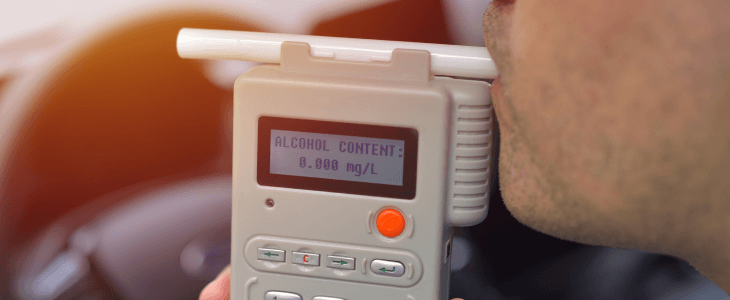Driving while intoxicated is never a good idea, but if you have been drinking and are stopped by the police in New York (including Long Island), the decision of whether to submit to a breathalyzer test is a matter of legal and personal consideration. Understanding the implications of submitting to or refusing the test is essential, as it can impact the outcome of a Driving Under the Influence (DUI) or Driving While Intoxicated (DWI) case and have long-term legal ramifications. This decision often hinges on a delicate balance between compliance with the law and safeguarding one’s legal rights, making it an extremely difficult choice for those navigating the New York legal system. The law that governs procedures surrounding DUIs and breathalyzer tests is found in New York Vehicle & Traffic Law § 1194 (2022).
Steps and Procedures When Pulled Over for a Suspected DUI
Initial Stop and Field Sobriety Test: The police officer will pull you over if they have reasonable suspicion that you may be driving under the influence. This suspicion could be based on erratic driving, an accident, or other observed signs of impairment. After the initial stop, the officer may ask you to perform a series of field sobriety tests, such as walking in a straight line, standing on one leg, or following an object with your eyes. These tests are designed to assess your coordination and balance.
Preliminary Breath Test (PBT): In New York, officers may offer you a Preliminary Breath Test (PBT) at the scene. The PBT is a handheld breathalyzer device used to estimate your blood alcohol content (BAC). You are not legally obligated to take the PBT in New York, and refusing it typically does not carry penalties (unlike refusing the chemical test after arrest, which does).
Arrest and Miranda Warnings: If, based on the initial observations and field sobriety tests, the officer has probable cause to believe you are intoxicated, you will likely be arrested for DUI. After you have been placed under arrest, the officer should read you your Miranda rights, which include the right to remain silent and the right to an attorney. It is generally advisable to exercise these rights and not answer further questions without an attorney present.
Implied Consent Warning and the Chemical Test: In New York, when you are arrested for DUI or DWI, you are subject to the state’s implied consent law. This means that by obtaining a driver’s license, you have already agreed to submit to chemical tests if arrested for suspicion of DUI. The officer will typically read you the implied consent warning, informing you of the consequences of refusing a chemical test. You will then be asked to take a chemical test to determine your BAC. In New York, this is typically done through a breathalyzer test, but it can also involve a blood or urine test. Refusing the chemical test after arrest can result in serious legal consequences.
Administrative Penalties and Criminal Charges: Depending on the results of the chemical test and whether you have prior DUI convictions, you may face administrative penalties. These penalties can be separate from any criminal charges.
If you refuse to take a breathalyzer test when requested by law enforcement, you can expect the following consequences:
- Administrative Penalties:
- Your driver’s license will be immediately suspended at the time of refusal for six months to a year and a fine of $500.
- If you had a prior DWI-related conviction or refusal within the past five years, the license revocation can be even longer.
- Criminal Penalties:
- In addition to the administrative penalties, refusing a breathalyzer test can be used against you in court as evidence of guilt.
- If you are convicted of DWI or DUI, the fact that you refused the test can lead to harsher criminal penalties, such as increased fines and longer license suspensions.
- Ignition Interlock Device: If you are convicted of a DWI offense or have a prior DWI-related conviction, you may be required to install an ignition interlock device (IID) in your vehicle as a condition of regaining your driving privileges.
It is important to note that while you have the right to remain silent during a DUI/DWI arrest and not incriminate yourself through questioning, refusing a chemical test is not the same as exercising your right to remain silent.
Criminal Charges: You will likely face criminal charges related to DUI, which can result in fines, probation, mandatory alcohol education programs, community service, and, in some cases, imprisonment. The severity of the penalties depends on factors such as your BAC level, prior convictions, and whether any aggravating circumstances were present.
Along with the additional penalties it will incur, refusing a breathalyzer will almost certainly be viewed as an admission of guilt when you go to court. Does this mean you should always consent to a breathalyzer test? In almost all cases, the best choice is to take the test and avoid additional penalties. However, there might be a very limited exception if you are extremely intoxicated and well beyond the legal limit, and concerned that you will be charged with Aggravated DUI (DWI). This charge could lead to more jail time. Although this is not something that we would advocate, if you do refuse to take a breathalyzer test, you will need an attorney to try to negotiate a reduction of penalties and criminal charges.
Contact Our Nassau County Criminal Defense Attorney Today
The penalties for refusing to take a breathalyzer in New York can be quite severe, including suspension of your license, fines, and possible imprisonment, depending on the degree of the charge and the specifics of the case. As a result, consulting an experienced New York criminal lawyer is essential. Contact the law firm of Michael A. Arbeit, P.C. They can help you navigate the system, defend your rights, and provide guidance on the possible consequences and the best course of action specific to your situation.

